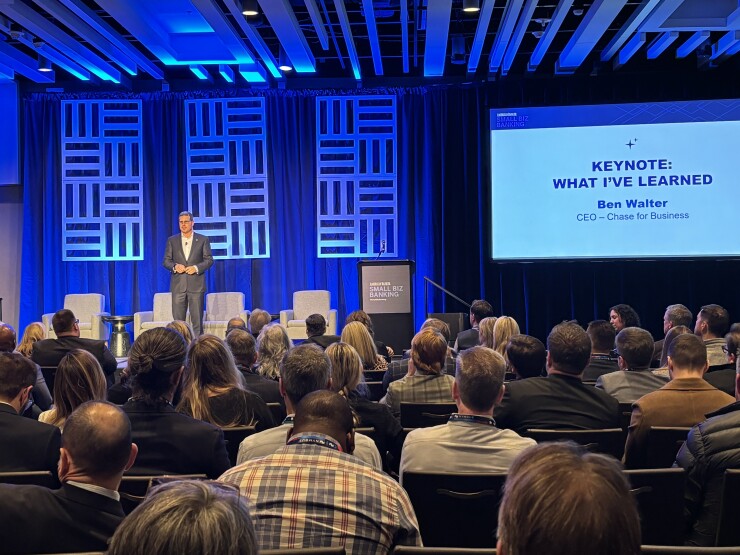NASHVILLE — Chase for Business CEO Ben Walter works in the New York City headquarters of the country's biggest bank today, but he started on a tarmac, tossing bags into the hold of an airplane.
As a 22-year-old aide to Continental Airlines CEO Gordon Bethune — "my job is literally to carry the files" — Walter found himself at an airport with his boss early one morning. "He says, 'Let's go down and see the guys,'" Walter recalled. He found himself planeside, helping Bethune and the ground crew load the luggage, with the CEO swearing like the Navy veteran he was. "We learned so much about what's going well and what's not," Walter said at American Banker's
Walter worked in six different industries and spent 12 years
Bankers should also stop talking about products to clients, who generally don't care. What they do care about is the passion that inspired them to start the company. "It's important that we remember that we bank a human, and when we try to make small businesses feel like a commercial enterprise only, we lose," he said.
With all the attention banks are paying today to automation and artificial intelligence, it's important to remember that small-business life is messy, Walter said. A typical owner might have started her company with a loan or equity stake from a relative that has no documentation. Banks want to standardize their requirements and procedures, but they can't lose sight of the individual nature of each small business.
In his prior role as retail CEO at the insurer Hiscox, Walter dealt with regulators around the world, which led him to conclude that "Europe tends to be five to 10 years ahead of the U.S. on the regulatory front." Seven years ago, European regulators started tightening rules about banking small businesses, a development that began in the U.S. after the PPP loan program. "Look for that to continue in the years to come," he said. "We all need to up our game."
For bankers hoping that the economy will turn around and help bank profitability, Walter offered a pessimistic view: "The margin compression never ends." He cited stock trading, which used to be a business with decent margins for brokerages, but today is a service many users expect to get for free.
For that reason, banks need to focus on costs, safeguard their brands and constantly be looking for the next innovation that can help margins, he said: "Someone out there is thinking of the next thing they're going to make money with, and someone at the same time is thinking about where you're making money and how to take it from you."
As the scale of the largest banks grows, driving down their unit costs, their smaller competitors need to figure out how to compete, Walter said: "You better know what you are going to be excellent at and stone-cold sober about what that thing is."
Walter emphasized the importance of "making hard choices" as a leader, and learning to say no to projects that aren't a priority. He also recommended repetition when delivering any message: "Say it over and over and over again until you hear them saying it without you."
He suggested hiring people who are smart enough to do the job and who would be fun to also "have a beer with you if you're on the road." It's up to leaders to ensure a team's culture emphasizes hard work as well as fun — not just happy hours and social events, but enjoying the work day. Said Walter: "If you take yourself so seriously that you're not having fun, everyone else is having a miserable time."







